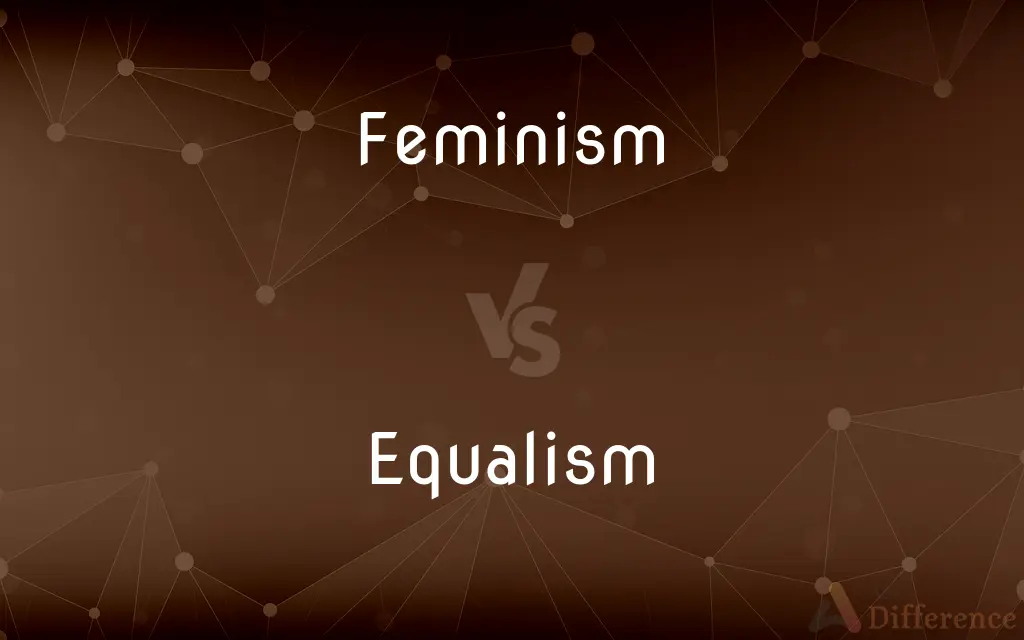Feminism vs. Equalism — What's the Difference?
By Tayyaba Rehman — Published on September 22, 2023
Feminism focuses on advocating for women's rights and addressing gender inequality, specifically as it disadvantages women. Equalism aims for equal rights and opportunities for all individuals, regardless of gender, race, or background.

Difference Between Feminism and Equalism
Table of Contents
ADVERTISEMENT
Key Differences
Feminism is a social, political, and cultural movement that advocates for women's rights and aims to establish equality between men and women, specifically in areas where women are disadvantaged. Equalism, on the other hand, is a broader concept that strives for equality for all individuals, regardless of their gender, race, or background. Feminism has a more specific focus, while Equalism covers a range of issues.
Feminism has roots in historical struggles for women's suffrage, reproductive rights, and workplace equality. Equalism does not necessarily have a historical focus on any particular group's struggles but is more of a generalized philosophy of fairness. While Feminism has clear historical milestones, Equalism doesn't have as strong a presence in historical movements.
In terms of public perception, Feminism often faces criticisms for being too focused on women's issues, sometimes to the exclusion of men's issues. Equalism is generally viewed as more inclusive, but it can be critiqued for diluting the focus needed to address specific injustices. Both Feminism and Equalism are subject to public debate and interpretation.
Feminism often involves organized activism and has many sub-types, including intersectional feminism, which considers how various forms of discrimination intersect. Equalism generally lacks such sub-categories and is more often a personal philosophy rather than an organized movement. Feminism often has a more structured form of activism, while Equalism is usually less formalized.
Comparison Chart
Focus
Women's rights
General equality
ADVERTISEMENT
Historical Roots
Women's suffrage, etc.
Less specific historical focus
Public Perception
Sometimes criticized for exclusivity
Seen as more inclusive but less focused
Activism
Often organized
Less formal
Sub-categories
Intersectional feminism, etc.
Generally lacks sub-categories
Compare with Definitions
Feminism
Feminism focuses on eliminating gender inequality.
Feminism fights against the wage gap between men and women.
Equalism
Equalism seeks to eliminate all forms of discrimination.
Equalism condemns both racism and sexism.
Feminism
Feminism includes various movements and ideologies.
Intersectional feminism considers the interplay of race, class, and gender.
Equalism
Equalism is a broad philosophy advocating fairness.
Equalism believes in a level playing field in educational opportunities.
Feminism
Feminism advocates for women's rights on the grounds of political, social, and economic equality to men.
Feminism played a key role in gaining women the right to vote.
Equalism
Equalism often operates as a personal philosophy.
His belief in equalism made him question traditional power structures.
Feminism
Feminism aims to empower women.
Feminism encourages women to take leadership roles.
Equalism
Equalism aims for equal rights for all individuals.
Equalism supports anti-discrimination laws that protect everyone.
Feminism
Feminism challenges traditional gender roles.
Feminism argues that household chores should not be gender-specific.
Equalism
Equalism is inclusive of various groups and backgrounds.
Equalism aims to benefit people of all genders, races, and classes.
Feminism
Belief in or advocacy of women's social, political, and economic rights, especially with regard to equality of the sexes.
Equalism
Synonym of egalitarianism
Feminism
The movement organized around this belief.
Equalism
The policy or practice of treating all things equally.
Feminism
(obsolete) The state of being feminine; femininity.
Equalism
The idea that emerging technologies will put an end to social stratification.
Feminism
A social theory or political movement which argues that legal and social restrictions on women must be removed in order to bring about equality of the sexes in all aspects of public and private life.
Feminism
A doctrine that advocates equal rights for women
Feminism
The movement aimed at equal rights for women
Common Curiosities
What is Feminism?
Feminism is a movement advocating for women's rights and gender equality.
Is Equalism gender-specific?
No, Equalism aims for equality for everyone, regardless of gender.
What is Equalism?
Equalism is a philosophy aiming for equal rights and opportunities for all.
Is Feminism only for women?
No, Feminism advocates for gender equality, benefiting both men and women.
What are some historical milestones of Feminism?
Women's suffrage, the Equal Pay Act, and Roe v. Wade are examples.
How is Feminism perceived publicly?
Public perception varies but it is sometimes criticized for being too exclusive.
Are there sub-types of Feminism?
Yes, such as intersectional feminism.
Is Feminism a form of Equalism?
Feminism can be considered a subset of Equalism focused on gender issues.
Does Equalism have historical milestones?
Equalism lacks specific historical milestones as it is a broader philosophy.
How is Equalism perceived publicly?
It is generally seen as inclusive but potentially less focused.
Does Feminism involve organized activism?
Yes, Feminism often involves organized efforts and campaigns.
Does Equalism involve organized activism?
Less commonly, as it's often a personal philosophy.
Can one be both a feminist and an equalist?
Yes, the two are not mutually exclusive.
Can men be feminists?
Yes, men can support and be involved in Feminism.
Are there sub-types of Equalism?
Generally, Equalism lacks specific sub-categories.
Share Your Discovery

Previous Comparison
Decree vs. Legislation
Next Comparison
Advertisement vs. PamphletAuthor Spotlight
Written by
Tayyaba RehmanTayyaba Rehman is a distinguished writer, currently serving as a primary contributor to askdifference.com. As a researcher in semantics and etymology, Tayyaba's passion for the complexity of languages and their distinctions has found a perfect home on the platform. Tayyaba delves into the intricacies of language, distinguishing between commonly confused words and phrases, thereby providing clarity for readers worldwide.













































